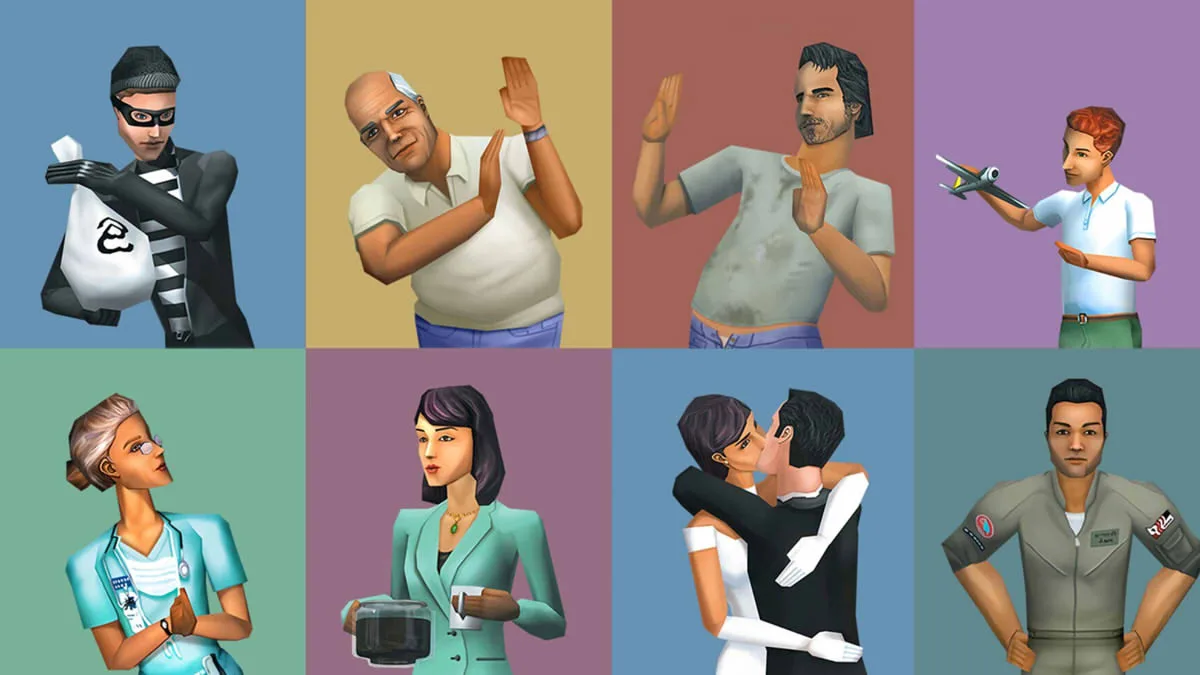The Sims has a surprisingly strong connection to the world of music. Be that the numerous collaborations with hit artists such as the Black Eyed Peas and Katy Perry who’ve brought their music to the series, or Simlish versions of songs by others such as FKA Twigs, sound is integral to the series.
And in this feature, I’m going to look back at the soundtrack with started it all with a Sims 1 music retrospective.
Background of the Sims 1 soundtrack
The Sims 1 soundtrack features compositions by Jerry Martin, Marc Russo, Dix Bruce and Kirk Casey. The majority of the soundtrack is provided by Martin and Russo, the former of who would go on to compose the majority of the music for the follow-up expansion, The Sims: Hot Date alongside some contributions by Kirk Casey.
Compared to the soaring music of The Sims 4, The Sims 1 is almost downbeat by comparison. Focusing on jazz, piano, woodwind instruments and a general focus on ‘muzak.’ It works perfectly as a soundtrack because it doesn’t demand much of the player’s headspace during long listening sessions.
Muzak, for those not in the know, is a term for music you’re not really meant to listen to, so much as just hear. Think elevator music, or what you hear when you’re on hold on the phone.
Unsurprisingly, many fans have made the mental connection to production music, which was used extensively in cartoons such as SpongeBob Square Pants, Ren & Stimpy, and perhaps most notably, in It’s Always Sunny in Philadelphia to comedic effect.
Mall Rat in particular owes more than a little to The Land of Chocolate composed by Alf Clausen for The Simpsons (which itself initially had a lot of elements parodying sitcoms and Americana), and his other work which was also intended to evoke the imagery of a bygone age in American entertainment and music. Not that this a bad thing of course.
The sound
But whether it be Martin’s incredibly calming ‘Buying Lumber’ (my personal favourite), or the ridiculously heavy metal parody ‘Sim Hagar’ by Dix Bruce, The Sims soundtrack covers the gamut between multiple genres. But it always returns home to the sitcom-style, inoffensive music that defines it in player’s memories.
Now, the connection is pretty obvious. As many have already made it in lengthy discourse around what The Sims originally ‘meant’ as a piece of art. VGM Quest has done a lengthy deep-dive that I intentionally avoided watching to prevent any crossover, so apologies if this ends up being a rehash.
But I think it is fair to say that The Sims was always meant to have at least some satirical elements towards the idea of suburban living and The American Dream. It was often called a digital dollhouse after all, and dollhouses typically don’t depict the reality of urban living.
The counterpoint
But I think that’s something of a simplification. Because if you look at the work previously done by these composers, particularly Jerry Martin, you can see that this type of music is not exactly out of character for them. Martin in particular composed for numerous entries in the original ‘Sim’ franchise, such as SimCopter and SimCity.
In SimCity 3000 we hear his style used in a grandiose way. It evokes images of soaring skyscrapers and busy streets. It’s an exciting view of urban life at the turn of the century. It makes you think Friends, not so much Leave it to Beaver.
The Sims, in that way, was meant to be a more intimate view of the not-quite-people you had previously administrated. And their wacky behaviour does lend itself to a more parodical, slightly comedic soundtrack.
You’re preventing someone from burning to death after making popcorn after all, not building the Empire State Building.
Parody or sincerity?
I consider Martin to be one of the most defining composers of the early Sim franchise, with respect to Russo and other contributors such as Anna Karney (who wrote Urban Complex for SimCity 3000, another as the kids say ‘banger’). And his work is surprisingly sincere, and doesn’t exactly feel as if it were penned with tongue firmly in cheek.
But, at the same time, I don’t deny that Martin’s work has a history of commercialism. His music was used in adverts for Toyota and Wells Fargo, after all. So sincere in this case doesn’t necessarily mean he wasn’t at least somewhat ‘in on the joke’. But like how Leslie Nielsen made comedy by being serious, Martin did so with genuinely wonderful, uplifting music overlaying your Sim having a meltdown over whatever personal crises you’ve inflicted on them this time.
Starting with The Sims 2, the soundtracks became both more contemporary and a lot more playful; one of the reasons I think that satire or parody isn’t as evident in The Sims 1’s soundtrack. So while I hesitate to say it was ‘better,’ I do think that The Sims 1’s soundtrack holds up the best of all.
Sounds of the Sims
Either way, The Sims soundtrack has something special about it and remains beloved by fans. Whether that be in discussion amongst fans or analysis by writers like myself. And while there’s an element of nostalgia talking, I think that there’s also something sincerely engaging outside of this just being an excellent soundtrack.
Certainly I can’t be the only person who feels that The Sims 4 can be a little blunt about its ‘everything is great!’ overtones. And I reckon a return to the lower-key past wouldn’t be unwelcome. Just don’t try and flog a ‘throwback soundtrack’ to us as an added extra, eh?
A lifelong Maxis fan who grew up with SimCity 3000 and the lesser-known DS titles in the Sims catalogue, Iwan brings the obscure knowledge of things that have been and will be when it comes to The Sims.
